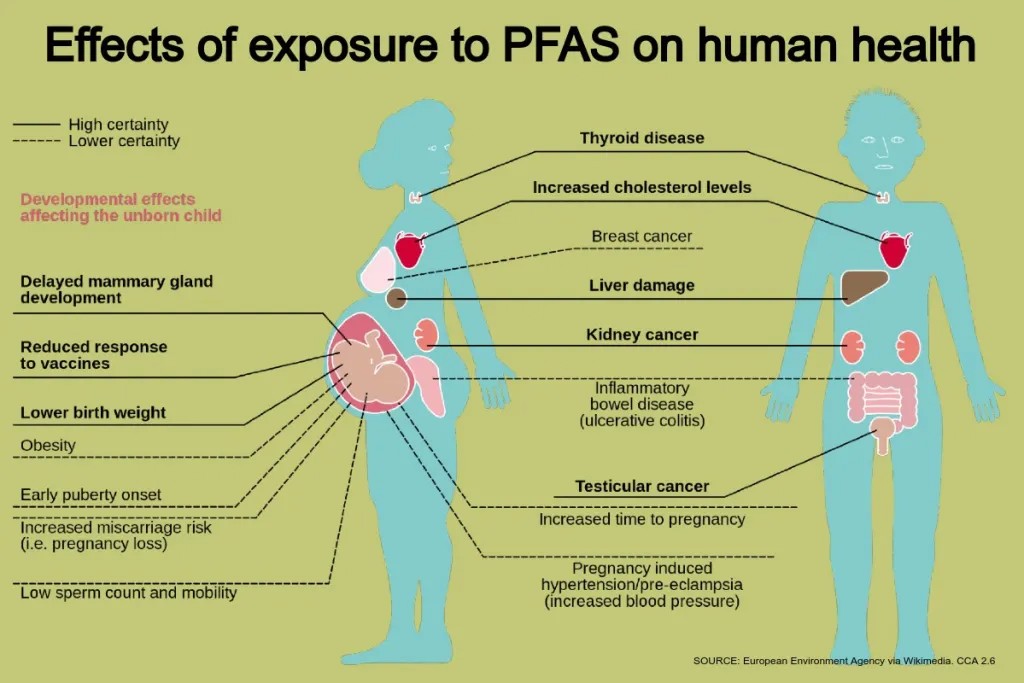STATEHOUSE REPORT | ISSUE 23.15 | April 12, 2024
BIG STORY: EPA limits on ‘forever chemicals’ prompt S.C. pushback, action
MORE NEWS: Book control proposal appears dead this session
LOWCOUNTRY, Ariail: A whole lot of rumbling going on
COMMENTARY, Brack: The unmitigated gall of legislators on bad energy bill
SPOTLIGHT: SC Institute for Independent Journalism
MYSTERY PHOTO: Somewhere over the …
FEEDBACK: Poll results are interesting
EPA limits on ‘forever chemicals’ prompt S.C. pushback, action

By Jack O’Toole | Municipal water providers across the country are pushing back on a new U.S. Environmental Protection Agency rule to reduce so-called “forever chemicals” in drinking water due to health risks – and South Carolina is no exception.
But there’s also action. In the next week, state health officials plan a briefing on the new federal rule.
Meanwhile, Charleston Water System, an independent government entity serving 500,000 residents in the Lowcountry, describes the rule as an “unfunded mandate” that will force it to raise rates on customers while providing very few real-world benefits.

“Over 10 years, we’ll spend $200 million to remove 3 to 5 parts per trillion (ppt) from your drinking water, when you can just walk across your living room floor and pick up half a million [ppt] from dust in your first breath,” Charleston Water System spokesman Mike Saia told Statehouse Report. “And that cost will have to get passed along to ratepayers.”
David Blaize, executive director of the South Carolina Water Associations directed Statehouse Report to an April 10 statement from the American Water Works Association (AWWA).
“AWWA estimates the cost of the rule is more than three times higher than the agency’s calculations,” the statement reads. “The magnitude of these additional costs will lead to affordability challenges in many communities.”
Mixed legislative reactions
So far, reaction from state leaders has been mixed.

“Putting much-needed additional limits on the amount of forever chemicals in drinking water is vitally important,” said Charleston Democratic state Rep. J.A. Moore, who first introduced clean water reform legislation in 2018. “These chemicals cause permanent damage to folks and can lead to everything from cancer to other life-threatening illnesses.”
Charleston Republican Sen. Chip Campsen said that, in light of CWS’s comments regarding compliance costs, he’d like to see a rigorous, evidence-based examination of the new rule.
“Maybe there’s a compelling reason to do this,” Campsen said. “But we need to do a real cost benefit analysis instead of having it handed down by the Biden administration.”
What are forever chemicals?
At issue are what experts call per-and polyfluoroalkyl substances (PFAS), a class of almost 15,000 synthetic chemicals that have been used since the 1950s to make fluoropolymer coatings and products that resist heat, oil, stains, grease and water.
Dubbed “forever chemicals” because they break down very slowly in the environment, PFAS have been found at high levels in everyday products like furniture, hamburger wrappers and stain-resistant clothing, and in common foods such as seafood, chocolate cake and microwave popcorn.
According to federal studies, 97% of Americans have some amount of PFAS in their blood. But average blood concentrations have declined by 85% since 1999 when many companies began phasing PFAS chemicals out of their products.
The new EPA rule would require water systems to reduce PFAS levels to 4 ppt or less by 2029. For perspective, 1 ppt is the equivalent of about 1 grain of sand in an Olympic-sized swimming pool.

A local impact with statewide implications
Quarterly testing has consistently shown PFAS levels of between 5 and 10 ppt in Charleston drinking water since 2018, CWS officials say.
“We understand that people want the water to be PFAS free – and we want the water to be PFAS free,” Saia said. “But when you’re talking about removing less than 5 parts per trillion at a cost of $200 million, … that’s a tremendous amount of money for an absolutely miniscule reduction in PFAS exposure.”
As previously reported in Statehouse Report’s sister publication, Charleston City Paper, PFAS chemicals have been found at high concentrations in the Lowcountry for years.
- Marine mammals. A series of tests conducted between 2003 and 2013 discovered “some of the highest levels of PFASs in marine mammals throughout the world.”
- Groundwater. In 2018, groundwater testing at Joint Base Charleston revealed PFAS levels of 1.15 million ppt.
- Local fish. A 2023 S.C. Department of Health and Environmental Control study found fresh-caught fish from the Ashley River and Goose Creek Reservoir with 14,900 ppt.

Riley Egger, director of land, water and wildlife programs for the Coastal Conservation League, agrees PFAS chemicals are found at high levels throughout the environment, and that South Carolina water systems will need state and federal grants to meet the new standard. Nevertheless, she says, public safety requires action.
“The appropriate amount of contamination in our drinking water is zero,” Egger said. “Getting this chemical out of our drinking water is the first step in protecting human health.”
Charleston Water System says it’s prepared to comply with the rule, but argues the science does not support the EPA’s action.
“It’s very questionable whether removing this tiny amount of PFAS will help human health,” Saia said. “But it’s absolutely certain this is going to be a major expense for our customers.”
Next steps for South Carolina
The S.C. Department of Health and Environmental Control says it plans to hold a statewide briefing on the new rule next week.
“Our number one goal is to have all of South Carolina’s water systems operate in compliance with all federal and state drinking water standards that help protect people’s health,” DHEC Director of Environmental Affairs Myra Reece said in a statement.
But she also made it clearDHEC is aware of the financial challenges.
“We understand how important it is for system operators, especially small and rural ones, to have the resources and assistance they need to meet and maintain compliance.” Reece said.
To that end, DHEC has been working for months with state-owned Santee Cooper, which operates the Lake Moultrie and Lake Marion regional water systems, to determine the most effective and cost-efficient way to remove PFAS from drinking water.
The hope is that Santee Cooper’s early testing will give other, smaller water systems a leg up in meeting the new standard.
“That was the intent of starting these evaluations last year,” said Santee Cooper spokesperson Mollie Gore. “(We want) to be able to provide information back to DHEC on effectiveness and cost, so they can pass that information on (to other providers) as appropriate.”
- Jack O’Toole reports on statewide issues for Statehouse Report and the Charleston City Paper. Have a comment? Send to: feedback@statehousereport.com.
Book control proposal appears dead this session

By Jack O’Toole | A controversial proposal to give control to the State Board of Education over which books will – and will not – be allowed in public school libraries may have to start over next year after a Senate panel delayed action.
Advocates say the proposal isn’t a book-banning effort. Rather, they say it aims to create a single statewide standard for reviewing books that have been challenged by parents or community members.
“The review of instructional materials in our public schools throughout the state is governed by a patchwork quilt of 80 or more different policies,” Miles Coleman, a Nelson Mullins attorney who helped write the proposal, told the subcommittee in one report.
But critics say the proposal’s language prohibiting books that contain descriptions or depictions of “sexual conduct” is overly broad and could lead to the removal of classics like George Orwekk’s 1984 and Toni Morrison’s Beloved.
“We object to this regulation as currently written,” said Paul Bowers, a spokesman for the ACLU of South Carolina. “It’s dangerous and would be a weapon in the hands of book banners.”
Due to the Senate subcommittee’s recent inaction, the proposal missed the legislature’s so-called “crossover” deadline, meaning that even if the Senate sent over a measure now, the state House of Representatives could only take it up with approval of a two-thirds majority.
In other recent headlines
 S.C. Senate looks at how to spend budget surplus. Some want it to go to a one-time property tax cut. Others want a reduced income tax.
S.C. Senate looks at how to spend budget surplus. Some want it to go to a one-time property tax cut. Others want a reduced income tax.- S.C. House approves letting candidates use campaign money for childcare. Candidates for elected office in South Carolina could use campaign donations to cover childcare expenses under legislation passed Tuesday in the House over the opposition of the hardline Freedom Caucus.
- Supporters urge S.C. lawmakers to take up medical marijuana bill. Supporters of the push to make South Carolina the 40th state to make medical cannabis legal remain hopeful the bill won’t get slowed down again this year, but time is running out.
- S.C. public college students could see 2% tuition hike. A proposal in the Senate would allow state colleges to increase their tuition rates up to 2% next year, even if the schools take the added state money. For students, it could mean an extra $200 to $300 for the next school year.
- Senate committee advances sweeping energy legislation despite concerns. A state Senate committee voted to fast-track a sweeping and controversial energy policy reform bill despite concerns from members of the public that the process was moving too quickly. They admit to not reading the massive bill, anyway.
- S.C. lawsuit reform dies in Legislature. The bill sought to change current state law that could leave individuals liable for all damages in a lawsuit, even if they were only partially at fault.
- Lawsuit accuses S.C. legislator of legal shenanigans. S.C Rep. Marvin Pendarvis, D-North Charleston, is being accused in a new lawsuit of settling another lawsuit without his client’s permission, forging that client’s signature and later attempting to pay off the man. Pendarvis has not commented, according to Thursday reports.
- Have a comment? Send to: feedback@statehousereport.com.
A whole lot of rumbling going on

Award-winning cartoonist Robert Ariail generally has a biting or funny comment about the great state of South Carolina in his weekly cartoon. This week, he offers a look at all of the fault lines of legislation tearing apart the legislature.
- Love the cartoon? Hate it? What do you think: feedback@statehousereport.com.
The unmitigated gall of legislators on bad energy bill

By Andy Brack | The Tuesday admission by a senior state senator urgently pushing passage of a controversial energy bill is a stark indictment of a broken legislative system.
 “I think nobody has read this bill, nobody,” state Sen. Gerald Malloy, D-Darlington, admitted during a Senate Judiciary Committee meeting. The revelation came during an argument over whether to send the bill to the Senate floor – which would speed up the process – or slow down and consider it in committee like work is supposed to be done.
“I think nobody has read this bill, nobody,” state Sen. Gerald Malloy, D-Darlington, admitted during a Senate Judiciary Committee meeting. The revelation came during an argument over whether to send the bill to the Senate floor – which would speed up the process – or slow down and consider it in committee like work is supposed to be done.
“That’s a pretty good reason to give it fair consideration before we vote on it, right?” S.C. Sen. Wes Climer, R-York, asked, trying to put the brakes on this legislation that would dramatically rewrite energy policy in favor of utilities and relieve regulatory pressures which protect consumers.
Malloy wasn’t having it, according to reporting by The State newspaper: “If you don’t like (the bill) you object to it, you can move to carry over, continue, recommit or table it,” he said. “You have many opportunities in the process to stop or delay a bill, so unless we’re trying to kill (the bill) you don’t put it back in committee without having a pathway forward.”

The unmitigated gall. The irresponsibly. And it benefits who? The powerful utilities who helped draft 77 pages of complicated policy legislation secretly as critics and neighbors got frozen out of the process.
And legislators wonder why many people no longer trust them. This kind of insider mess smells much worse than anything emanating from a factory pig farm.
“That is how we get high electric bills in South Carolina – by having legislators pass whatever the utility company lawyers write without even reading it,” noted longtime energy analyst Eddy Moore, decarbonization director of the Southern Alliance for Clean Energy.
Another critic, who asked to be unnamed, was even more pointed: “This is legislative malpractice when you openly admit you are going to advance the bill out of committee having never read the bill. That’s shocking.”
Unfortunately, we’ve been down this road before. We’ve seen how bad energy policy costs billions of dollars and requires a huge bailout by ratepayers.
Remember, it wasn’t too many years ago that the General Assembly passed the Base Load Review Act, which quickly led to the stellar idea of building an expensive nuclear plant in Fairfield County. But when it failed – at a cost of more than $9 billion – guess who was left holding the bag?
And now, guess who wants the state to commit to more bad energy policy to build an expensive natural gas plant and costly pipeline system surrounded by protected land in a rural Colleton County? Yep, the very same utility players who led us into the nuclear fiasco.
Regardless of anything in the bill, the backroom dealing that got it to this point – not to mention the lack of transparency and broad public input – should have been enough to turn noses.
Greenville lawyer Tom Ervin, who recently resigned from the state Public Service Commission because of the games and shenanigans being played out with the energy bill, said it simply was not in the interest of South Carolinians.
“This bill is loaded with items that would only benefit the profit margins for these monopoly investor-owned utilities at the expense of poor ratepayers.”
Moore said if the bill passed, you would be handing over a credit card to the utility companies.
“This bill could easily add over $1,000 for every man, woman, and child in South Carolina to electric system costs while actually blocking cheaper alternatives,” he said.
South Carolinians should be outraged at the flagrant way they’re being punked by legislators doing the bidding of utilities. Sure, we may need to start generating more power. But twerking the system without proper process and consideration is a terrible way to govern.
Call your state senators today and remind them that there’s an election in November. Get them to kill this bill instead of drowning us with legislation they haven’t even read.
- Andy Brack is editor and publisher of Statehouse Report and the Charleston City Paper. Have a comment? Send to: feedback@statehousereport.com
S.C. Institute for Independent Journalism
 Statehouse Report is brought to you for free thanks to underwriters like the South Carolina Institute for Independent Journalism, which supports the development and production of independent and nonprofit news in South Carolina to promote democratic ideals.
Statehouse Report is brought to you for free thanks to underwriters like the South Carolina Institute for Independent Journalism, which supports the development and production of independent and nonprofit news in South Carolina to promote democratic ideals.
SCIIJ achieves its mission by providing financial and organizational support to community publications; operating civic engagement initiatives; training promising journalists; and producing bold independent journalism.
Somewhere over the …

A longtime reader sent in this rainbow picture taken somewhere in South Carolina. There’s a big clue in the photo, but it still may be difficult. Where was this photo taken? Send your name, hometown and guess to: feedback@statehousereport.com.
 Last week’s “Mountains” mystery was relatively easy for many readers, who correctly guessed that it was Table Rock in Pickens County.
Last week’s “Mountains” mystery was relatively easy for many readers, who correctly guessed that it was Table Rock in Pickens County.
Allan Peel of San Antonio, Texas, shares the following: “The photo was shot (facing southwest) from Caesars Head Overlook near the Caesars Head State Park Visitor Center in Cleveland, S.C. Table Rock Mountain is the rocky cliff just in the center-left of the mystery photo. The highest peak in the center of the mystery photo is Pinnacle Mountain, part of the Southern Appalachians mountain range at the edge of the Blue Ridge Mountains, and the tallest mountain contained entirely within the state of South Carolina.”
Hats off to those who identified it: Will Bradley of Las Vegas, Nevada; Jay Altman, John Hart and Elizabeth Jones, all of Columbia; Curtis Joyner of Charleston; George Graf of Palmyra, Va.; Gwen Strickland of Marion; David Lupo of Mount Pleasant; Pat Keadle of Wagener; Frank Bouknight and Daniel Prohaska, both of Summerville; Michael Webb and Bill Segars, both of Hartsville; Jacie Godfrey of Florence; and Penny Forrester of Tallahassee, Fla.
- Send us a mystery picture. If you have a photo that you believe will stump readers, send it along (but make sure to tell us what it is because it may stump us too!) Send to: feedback@statehousereport.com and mark it as a photo submission. Thanks.
Poll results are interesting
To the editor:
![]() Nice article about the poll and its results. I have kind of stopped watching the talking heads.
Nice article about the poll and its results. I have kind of stopped watching the talking heads.
I am reading a really nasty book, White Rural Rage. It describes why it is that rural folk are mad and have been for a long while. They find their emotional friend in [former President Donald] Trump who tells them what they want to hear – anger, rage and hatred against all kinds of people. I wrote a small book in 1991 called There are no subways in Lickingville, which kind of foretold these happenings.
– Arnold Hillman, Bluffton, S.C.
Send us your thoughts
We encourage you to send in your thoughts about policy and politics impacting South Carolina. We’ve gotten some letters in the last few weeks – some positive, others nasty. We print non-defamatory comments, but unless you provide your contact information – name and hometown, plus a phone number used only by us for verification – we can’t publish your thoughts.
- Have a comment? Send your letters or comments to: feedback@statehousereport.com. Make sure to provide your contact details (name, hometown and phone number for verification. Letters are limited to 150 words.
- ORDER NOW: Copies are in Lowcountry-area bookstores now, but if you can’t swing by, you can order a copy online today.
- Now available as an e-book!
ABOUT STATEHOUSE REPORT
Statehouse Report, founded in 2001 as a weekly legislative forecast that informs readers about what is going to happen in South Carolina politics and policy, is provided to you at no charge every Friday.
- Editor and publisher: Andy Brack, 843.670.3996
Donate today
We’re proud to offer Statehouse Report for free. For more than a dozen years, we’ve been the go-to place for insightful independent policy and political news and views in the Palmetto State. And we love it as much as you do.
But now, we can use your help. If you’ve been thinking of contributing to Statehouse Report over the years, now would be a great time to contribute as we deal with the crisis. In advance, thank you.
Buy the book
Now you can get a copy of editor and publisher Andy Brack’s We Can Do Better, South Carolina! ($14.99) as a paperback or as a Kindle book ($7.99). . The book of essays offers incisive commentaries by editor and publisher Andy Brack on the American South, the common good, vexing problems for the Palmetto State and interesting South Carolina leaders.
More
- Mailing address: Send inquiries by mail to: P.O. Box 21942, Charleston, SC 29413
- Subscriptions are free: Click to subscribe.
- We hope you’ll keep receiving the great news and information from Statehouse Report, but if you need to unsubscribe, go to the bottom of the weekly email issue and follow the instructions.
- Read our sister publication: Charleston City Paper (every Friday in print; Every day online)
- © 2024, Statehouse Report, a publication of City Paper Publishing, LLC. All rights reserved.















 We Can Do Better, South Carolina!
We Can Do Better, South Carolina!